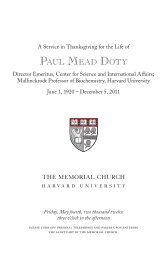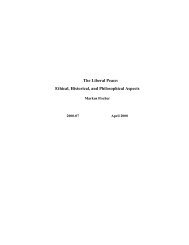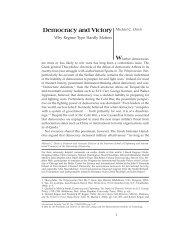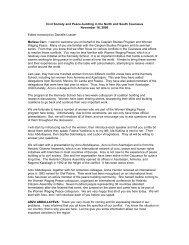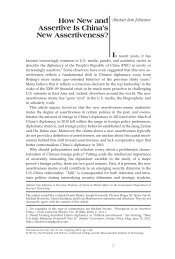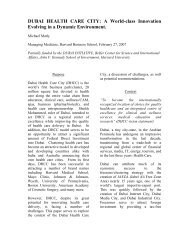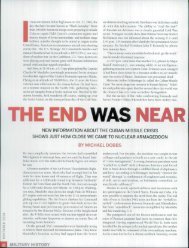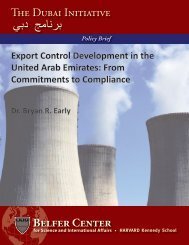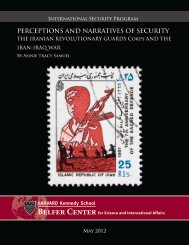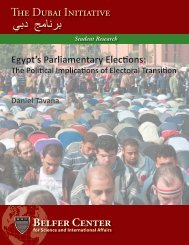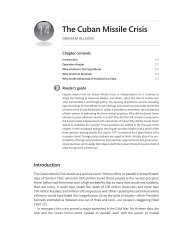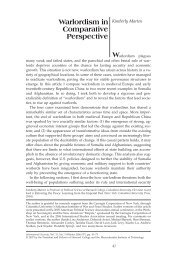The Cuban missile crisis and intelligence performance
The Cuban missile crisis and intelligence performance
The Cuban missile crisis and intelligence performance
You also want an ePaper? Increase the reach of your titles
YUMPU automatically turns print PDFs into web optimized ePapers that Google loves.
Downloaded by [Harvard College] at 08:23 18 September 2012<br />
210 INTELLIGENCE AND THE CUBAN MISSILE CRISIS<br />
course, it is conceivable that they simply inferred that Soviet <strong>intelligence</strong> in Cuba must<br />
have been aware of it as well. This might have been an accurate judgment. But even if it<br />
were incorrect, it would be natural, because the <strong>Cuban</strong>s - like the Americans - understood<br />
the Soviet Union as a coherent rational actor. See our discussion in note 96, below.<br />
15. Fursenko <strong>and</strong> Naftali, pp.80-82.<br />
16. Ibid. p.82.<br />
17. Fursenko <strong>and</strong> Naftali, p.70; Amuchastegui, pp.91-2.<br />
18. Nicola Miller, Soviet Relations with Latin America 1959-1987 (Cambridge UP 1989);<br />
Jorge I. Dominguez, To Make a World Safe for Revolution: Cuba's Foreign Policy<br />
(Cambridge, MA: Harvard UP 1989).<br />
19. Amuchastegui, p.99.<br />
20. Personal communications. Naftali adds in another personal communication: 'It seems odd<br />
that Alekseev would have been recalled [to Moscow] in the manner he was if Che was on<br />
his way to Cuba. [Also,] I have a clear recollection of the letters prepared by the Presidium<br />
for Castro in the first week of May, <strong>and</strong> not one refers to a fraternal visit by El Che.'<br />
21. Aleks<strong>and</strong>r Fursenko <strong>and</strong> Timothy Naftali, 'One Hell of a Gamble': Khrushchev, Castro <strong>and</strong><br />
Kennedy, 1958-1964 (NY: Norton 1997) p.70. Amuchastegui finds it difficult to imagine<br />
that Che would have made such a probe at that time, <strong>and</strong> recalls that the chief purpose of<br />
Che's visit was to discuss economic cooperation (personal communication).<br />
22. Amuchastegui, p.99.<br />
23. Che's next documented voyage to the Soviet Union took place in late August 1962. <strong>The</strong><br />
chief purpose of that trip was to propose making the deployment public. It seems unlikely<br />
that Amuchastegui is thinking of this particular trip, as increasing levels of military aid<br />
were not on the agenda. Blight <strong>and</strong> Welch, On the Brink (note 5) pp.333-4.<br />
24. Fursenko <strong>and</strong> Naftali, 'One Hell of a Gamble' (note 21) p.168.<br />
25. Ibid. p. 187.<br />
26. Garthoff, pp.28-9, 58, note 28.<br />
27. See ibid. p.28.<br />
28. Beth Fischer gives good reasons for preferring a cognitive to a motivational explanation in<br />
her essay [pp. 28-9].<br />
29. Amuchastegui, pp.115-16, note 38.<br />
30. Garthoff, pp.22-3.<br />
31. See, e.g., the reports of 27 Sept. <strong>and</strong> 1 Oct., reprinted in Mary S. McAuliffe (ed.) CIA<br />
Documents on the <strong>Cuban</strong> Missile Crisis (Washington DC: CIA History Staff 1992)<br />
pp. 107-9 (hereafter CIA Documents).<br />
32. [Richard Lehman], Excerpt from Memo for Director of Central Intelligence, 'CIA<br />
H<strong>and</strong>ling of the Soviet Buildup in Cuba', 14 Nov. 1962 [Excerpt], Top Secret, declassified;<br />
in CIA Documents (note 31) p.99.<br />
33. Certainly there is ample evidence that the KGB played at best a minor role throughout. It<br />
would appear from the somewhat thinner testimonial <strong>and</strong> documentary record on Soviet<br />
military <strong>intelligence</strong> that the GRU was marginalized as well. See generally Fursenko <strong>and</strong><br />
Naftali, 'One Hell of a Gamble' (note 21) passim.<br />
34. Fursenko <strong>and</strong> Naftali, p.75.<br />
35. In his annual message to Congress on 2 Dec. 1823, President James Monroe warned<br />
European states against any future attempts to colonize the Americas, declared that the<br />
United States would consider any attempt by the nations of Europe to extend their system<br />
into the hemisphere 'dangerous to our peace <strong>and</strong> safety', <strong>and</strong> disavowed American<br />
participation in European wars. See Ernest R. May, <strong>The</strong> Making of the Monroe Doctrine<br />
(Cambridg, MA: Belknap 1975). While Khrushchev may have believed that American<br />
participation in World Wars I <strong>and</strong> II represented a renunciation of the Monroe Doctrine,<br />
Troyanovsky would have known that no one in the United States so considered it.<br />
36. Blight, Allyn, <strong>and</strong> Welch, Cuba on the Brink (note 5) p.72.<br />
37. <strong>The</strong> KGB, despite a lack of highly-placed sources, seems to have had a fairly good<br />
underst<strong>and</strong>ing of President Kennedy, his attitude toward Cuba, <strong>and</strong> the constraints under<br />
which he operated domestically. Fursenko <strong>and</strong> Naftali, pp.68-9.<br />
<strong>The</strong> KGB's reading of the Bay of Pigs - that JFK had been pushed by the CIA <strong>and</strong> by



